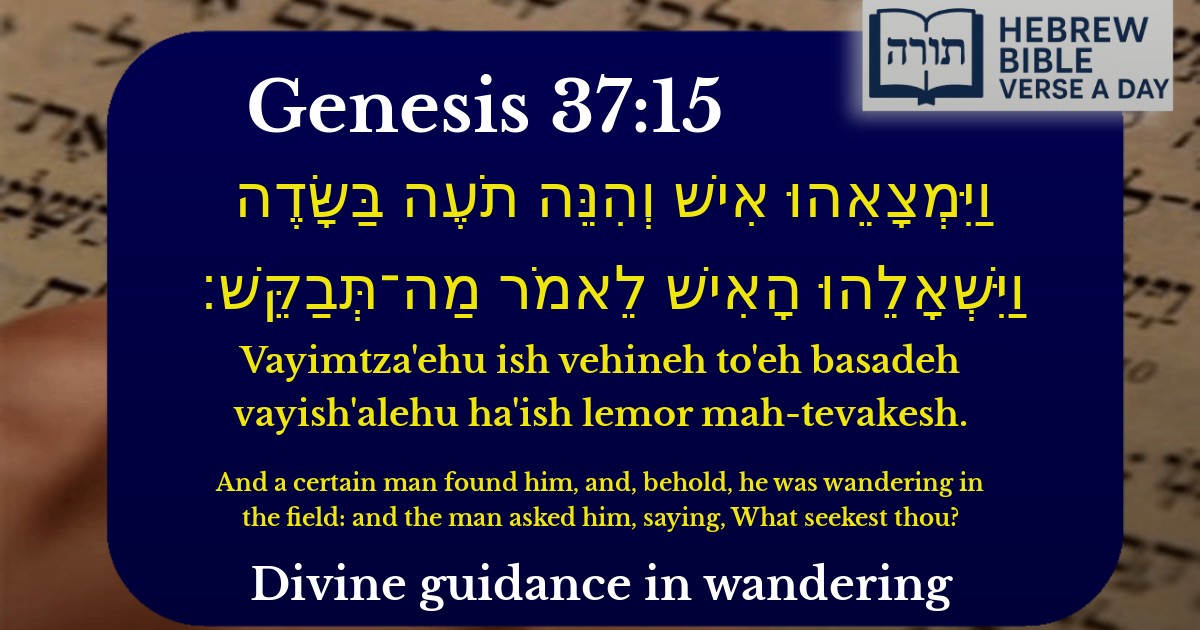Join Our Newsletter To Be Informed When New Videos Are Posted
Join the thousands of fellow Studends who rely on our videos to learn how to read the bible in Hebrew for free!
Hebrew Text
וַיִּמְצָאֵהוּ אִישׁ וְהִנֵּה תֹעֶה בַּשָּׂדֶה וַיִּשְׁאָלֵהוּ הָאִישׁ לֵאמֹר מַה־תְּבַקֵּשׁ׃
English Translation
And a certain man found him, and, behold, he was wandering in the field: and the man asked him, saying, What seekest thou?
Transliteration
Vayimtza'ehu ish vehineh to'eh basadeh vayish'alehu ha'ish lemor mah-tevakesh.
Hebrew Leining Text
וַיִּמְצָאֵ֣הוּ אִ֔ישׁ וְהִנֵּ֥ה תֹעֶ֖ה בַּשָּׂדֶ֑ה וַיִּשְׁאָלֵ֧הוּ הָאִ֛ישׁ לֵאמֹ֖ר מַה־תְּבַקֵּֽשׁ׃
וַיִּמְצָאֵ֣הוּ אִ֔ישׁ וְהִנֵּ֥ה תֹעֶ֖ה בַּשָּׂדֶ֑ה וַיִּשְׁאָלֵ֧הוּ הָאִ֛ישׁ לֵאמֹ֖ר מַה־תְּבַקֵּֽשׁ׃
🎵 Listen to leining
Parasha Commentary
📚 Talmud Citations
This verse is not quoted in the Talmud.


Context of the Verse
This verse (Genesis 37:15) describes Yosef (Joseph) wandering in the field while searching for his brothers, who were shepherding their father's flocks. The "certain man" who finds him plays a pivotal role in directing Yosef toward his brothers, setting in motion the events that lead to his eventual descent to Egypt.
Rashi's Commentary
Rashi explains that this "man" was actually the angel Gavriel (Gabriel), sent by Hashem to ensure Yosef would meet his brothers. The Torah uses the term "אִישׁ" (man) to describe an angel in other instances as well (e.g., Jacob wrestling with the angel in Genesis 32:25). Rashi notes that Yosef was "תֹעֶה בַּשָּׂדֶה" (wandering in the field) because he was lost and uncertain of his brothers' location.
Midrashic Insights
Rambam's Perspective
In Moreh Nevuchim (Guide for the Perplexed), Rambam discusses how divine providence often operates through seemingly natural events. This "man" asking Yosef "מַה־תְּבַקֵּשׁ" (What seekest thou?) reflects Hashem's hidden guidance, steering Yosef toward his destiny.
Chassidic Interpretation
The Baal Shem Tov teaches that every encounter in life is orchestrated by divine providence. The "man's" question—"What seekest thou?"—can be understood as a spiritual challenge: a person must always clarify their true intentions and align them with Hashem's will.
Halachic Implication
The Gemara (Sotah 10b) derives from this verse the importance of asking for directions when lost, as Yosef humbly accepted guidance from the "man." This underscores the value of seeking help rather than persisting in confusion.